Has Citizens United Undermined Democracy?

Hari Osofsky, Dean and Myra and James Bradwell Professor of Law, cordially invites you to the Newt and Jo Minow Debate Series, presented in-person and virtually in partnership with Open to Debate.
Wednesday, February 21st
5:00 p.m. CT
Northwestern Pritzker School of Law
Thorne Auditorium
375 E. Chicago Ave, Chicago, IL 60611
In a high-stakes presidential election year, in partnership with the Newt and Jo Minow Debate Series at the Northwestern Pritzker School of Law, Open to Debate is taking a look at more than a decade of the Citizens United Supreme Court case. The 2010 landmark decision that ruled the free speech clause of the First Amendment prohibits the government from restricting independent expenditures for political communications by corporations, including nonprofits, labor unions, and other associations, changed the landscape of political spending in the U.S. This gave rise to Super PACS and an increase in election campaign spending. Since then, there have been questions about whether the decision has harmed our democratic process. Those who support the decision argue it upholds free speech, allowing diverse voices in the political arena, and broadens the range of discourse by enabling groups to freely express their views and support candidates or policies. Those against it argue that it allows a disproportionate influence from corporations and special interest groups, and leaves the voices of ordinary citizens overshadowed by the financial resources of a few, eroding the principles of equality and fair representation.
The Debaters
For the motion
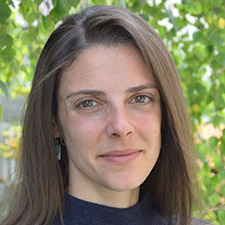
Francesca Procaccini
Assistant Professor of Law, Vanderbilt University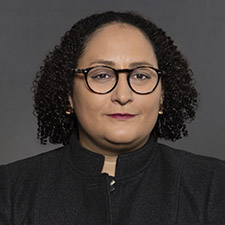
Ciara Torres-Spellicsy
Professor of Law, Stetson University
Against the motion
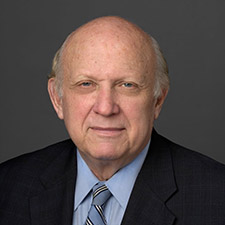
Floyd Abrams
Senior Counsel, Cahill, Gordon & Reindel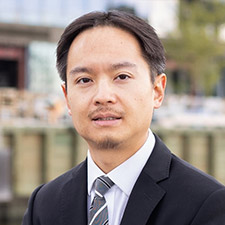
Eric Wang
Partner, Gober Group; Senior Fellow, Institute for Free Speech
Host and Moderator
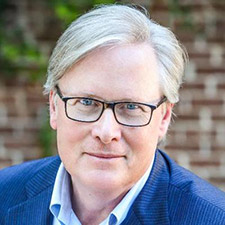
John Donvan
Moderator-in-Chief, Open to Debate
About the Newt and Jo Minow Debate Series
The Newt and Jo Minow Debate Series at Northwestern Pritzker School of Law is made possible by friends and colleagues of Newton N. Minow, a 1950 graduate of Northwestern Law. Together they honored Mr. Minow’s numerous contributions to public and civic life by generously establishing an endowment to support a series of debates that engage outside experts, law school faculty, and students on important and timely legal topics.
About Open to Debate
America is more divided than ever—but it doesn’t have to be.
Open to Debate (formerly Intelligence Squared U.S.) offers an antidote to the chaos. We bring multiple perspectives together for real, nonpartisan debates. Debates that are structured, respectful, clever, provocative, and driven by the facts. Open to Debate is on a mission to restore balance to the public square through expert moderation, good-faith arguments, and reasoned analysis. We examine the issues of the day with the world’s most influential thinkers spanning science, technology, politics, culture, and global affairs. We provide a forum for balanced and intelligent debate that is widely distributed as a radio program, podcast, online broadcast, television, and digital video series. We help foster critical thinking in the next generation of leaders by making our extensive research archives and debate content available for classroom use. It’s time to build a stronger, more united democracy with the civil exchange of ideas.
Be open-minded. Be curious. Be ready to listen. Join us in being Open to Debate.
About The Debaters
Francesca Procaccini researches and writes about federal courts and constitutional law, particularly First Amendment law. She joined Vanderbilt University Law School in 2022 after teaching at Harvard Law School as a Climenko Fellow, where her scholarship focused on constitutional political rights. Before that, she was a fellow with the Yale Law School Information Society Project, where she researched modern applications of First Amendment law to digital political speech and taught courses on free speech law and media law. Procaccini was also an appellate attorney in the Civil Rights Division of the U.S. Department of Justice, where she litigated civil rights cases in the U.S. Courts of Appeals and the U.S. Supreme Court, and a law clerk for Judge Jerome Farris of the U.S. Court of Appeals for the Ninth Circuit. Her scholarly articles have been published in the Virginia Law Review, Fordham Law Review, Harvard Journal on Legislation, and Harvard Civil Rights-Civil Liberties Law Review. Additionally, her legal analysis has appeared in the New York Times, Los Angeles Times, The Atlantic, and Lawfare. Procaccini earned her law degree cum laude at Harvard Law School, and she is a summa cum laude and Phi Beta Kappa graduate of Barnard College.
Ciara Torres-Spelliscy teaches courses in the First Amendment, Corporate Governance, Business Entities, and Constitutional Law. Before joining Stetson, she was counsel in the Democracy Program of the Brennan Center for Justice providing guidance on the issues of money in politics and the judiciary to state and federal lawmakers, an associate at Arnold & Porter LLP, and a staffer for Sen. Richard Durbin. She is the author of “Corporate Citizen: An Argument for the Separation of Corporation and State” and “Political Brands”. Torres-Spelliscy has testified before Congress and has helped draft legislation and Supreme Court briefs. She’s been published in many law reviews, along with The Washington Post, New York Times, New York Law Journal, U.S. News and World Report, Roll Call, the ABA Judges Journal, and other newspapers. She has been named a member of the Lawyers of Color's "50 Under 50" list of minority law professors making an impact in legal education and is a member of the AALS Section on Constitutional Law Executive Committee. She is a Brennan Center Fellow, a member of the Scholars Strategy Network, the Vice Chair of the Mertz Gilmore Foundation, and a former board member of the National Institute on Money in State Politics.
Floyd Abrams is Senior Counsel in Cahill Gordon & Reindel LLP's litigation practice group. Abrams has extensive experience in high-visibility matters, often involving First Amendment, intellectual property, public policy, and regulatory issues, arguing frequently in the Supreme Court in high-profile cases. He represented The New York Times during the Pentagon Papers case, Judith Miller in the CIA leak grand jury investigation, Citizens United in Citizens United v. Federal Election Commission, and other high-profile clients such as Standard & Poor's, Lorillard Tobacco Company, NPR, and Hearst. He founded the Abrams Institute for Freedom of Expression at Yale Law School, which promotes free speech, scholarship, and law reform on emerging questions concerning traditional and new media. He previously clerked for Judge Paul Conway Leahy of the U.S. District Court for the District of Delaware and was a visiting lecturer at Columbia and Yale Law Schools. Described as "the most significant First Amendment lawyer of our age," Floyd has been elected to the American Academy of Arts & Sciences and has been awarded the Walter Cronkite Freedom of Information Award and the Thurgood Marshall Award of the Association of the Bar of the City of New York, among other awards.
Eric Wang is a partner at The Gober Group and a pro bono Senior Fellow at the Institute for Free Speech (IFS). His practice focuses on federal and state campaign finance, lobbying, political nonprofits, and government ethics laws. He has advised clients on the campaign finance laws in all fifty states and in many municipalities. At the Institute for Free Speech, Wang helps advocate for reducing the regulatory burden on clients exercising their First Amendment rights. He was previously Special Counsel in the Election Law practice group at the Washington, D.C. law firm of Wiley Rein, interim general counsel at Americans for Prosperity, and counsel to former Commissioner Caroline Hunter at the Federal Election Commission. His articles on political law issues have been published in USA Today, Roll Call, The Hill, Politico, and The Washington Times, among other outlets. He earned his J.D. from the University of Virginia School of Law and holds a B.A. in Public Policy from Princeton University.
About the Host and Moderator
John Donvan is the host of Open to Debate and has been moderating our debates since 2008. An author, speaker, and journalist, John has reported for ABC, CNN, and PBS, including multi-year postings in Moscow, London, Jerusalem, and Amman, and a term as chief White House correspondent for ABC News. His 2016 book, “In a Different Key: The Story of Autism”, was a New York Times bestseller and a Wall Street Journal Top Ten Nonfiction Book of the Year. John is a four-time Emmy Award winner and was a National Magazine Award finalist in 2010.
This event is part of The Newton and Jo Minow Debate Series.






